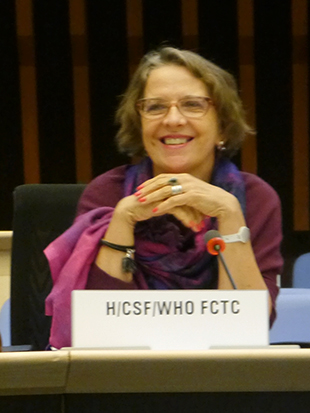
GOOD morning.
I’d like you to imagine an industry with tens of thousands of employees, large factories and distribution networks, political influence and well-funded lobbyists whose main product is disease. Imagine that even as it sells disease, it depicts itself as a partner for health systems and governments trying to treat the effects of its products.
It sounds strange, doesn’t it? Unreal. Could a business so demonstrably destructive be allowed to operate?
Welcome to the world of tobacco, a multibillion-dollar industry that kills half its consumers, fills hospitals around the globe with sick people and describes its victims as citizens exercising their fundamental right to choose.
Tobacco kills more than 6 million people a year, it’s responsible for one-in-six deaths from non-communicable diseases and it’s the only common risk factor in the four main NCD categories of cancer, cardiovascular disease, respiratory illness and diabetes.
This is a worldwide epidemic and it requires a considered and effective international response. That was recognised in 2005 when the WHO Framework Convention on Tobacco Control (WHO FCTC) took effect and became the world’s first modern public health treaty. Now, 11 years later, we have 180 Parties together representing 80% of the world’s population.
With more than a decade of experience, we know what works. And that knowledge helps to inform the targets we have been set. The most important of these is to reduce tobacco consumption among people aged over 15 by 30% within the next nine years. That doesn’t give us much time.
Becoming a Party to the Convention is not an end in itself. Parties are required to take significant steps to implement its provisions. That message was underlined by the UN Sustainable Development Goals agreed last year, which specifically highlight strengthening the Convention as part of its healthy lives and wellbeing goal.
The Convention Secretariat, which I lead, does everything possible to assist the Parties, but the main driver must be national governments.
As many of you know, it is not always easy to persuade different arms of government to work together.
NCD directors and health ministries are critical participants in organising implementation of the Convention, but they need to link up with others. Tax and excise policy requires the involvement of finance and customs authorities, tobacco growing may mean the involvement of the agriculture ministry and manufacturing output may be the responsibility of the trade or industry ministry.
We have to hurry, because WHO has established indicators and will report progress to the United Nations General Assembly late next year.
It’s worth remembering too that Parties face deadlines on implementation in some of these areas. Five years after Convention ratification, Parties pledge to have introduced smoke-free policies and bans on tobacco advertising, promotion and sponsorship. And there is a three-year deadline for implementation of the packaging and labelling provisions. Some Parties have missed these deadlines and ought now to. take urgent remedial action.
For tobacco, the four assessed areas will be tax, smoke-free environments, advertising/sponsorship bans and mass media campaigns.
Parties are often failing to meet these goals. For example, 117 states have not met the tobacco tax progress indicator while just three have achieved it.
The good news is that achieving our goals is not that difficult. Most solutions – like tobacco tax rises - can be introduced swiftly and don’t cost a huge amount of money.
There are many other government-led actions that have an effect – plain packaging and large health warnings on tobacco products are also low-cost approaches offering significant benefits.
I want to return to the opening of my address to you today – the battle against the tobacco industry itself.
This industry will not – to paraphrase the Welsh poet Dylan Thomas – go quietly into that good night, it is an old industry that will burn and rave at close of day.
Tobacco companies have fought a fierce struggle against every effective new measure we have introduced. These wealthy companies employ battalions of lawyers, marketing executives and public relations executives to confound our every aim.
So as a fundamental first step, it is vital that we confront this dirty business and deny it access to policymakers. For too long now, the tobacco industry has enjoyed a covert presence at discussions – sometimes even at Convention meetings. It is not a benign participant. The industry must be locked out.
At the same time, we must end the use of illicit channels as a means to sell more tobacco and to enter new markets. It is well-established that organised crime and even terrorists are involved in this trade, but also that the tobacco industry itself is a participant.
The Protocol to Eliminate Illicit Trade in Tobacco Products was adopted by Parties to the WHO FCTC in 2012 and is currently open for ratification. It is taking time, but once the Protocol enters into force, government tax receipts will rise as the illicit trade is strangled, and rising health care costs will decline, or slow, as fewer people are enticed to consume tobacco.
So there are things we can do - what we cannot is sit still and hope that the rise in tobacco consumption will end by itself.
Greater co-operation is key. The FCTC’s own Conference of the Parties has recognised the need for increased co-operation among the multiple agencies dealing with tobacco by requiring the Secretariat to strengthen its ties to other important actors, including the Global Coordination Mechanism on the Prevention and Control of Noncommunicable Diseases.
Let me end by saying this: there may be times when it seems that we have a long way to go – but we should remember how far we have come.
It has taken multiple decades to reach this point - a moment when we all agree that this product does untold harm, and that robust global action is required to end the sad consequences of tobacco consumption.
Now let’s finish the job.